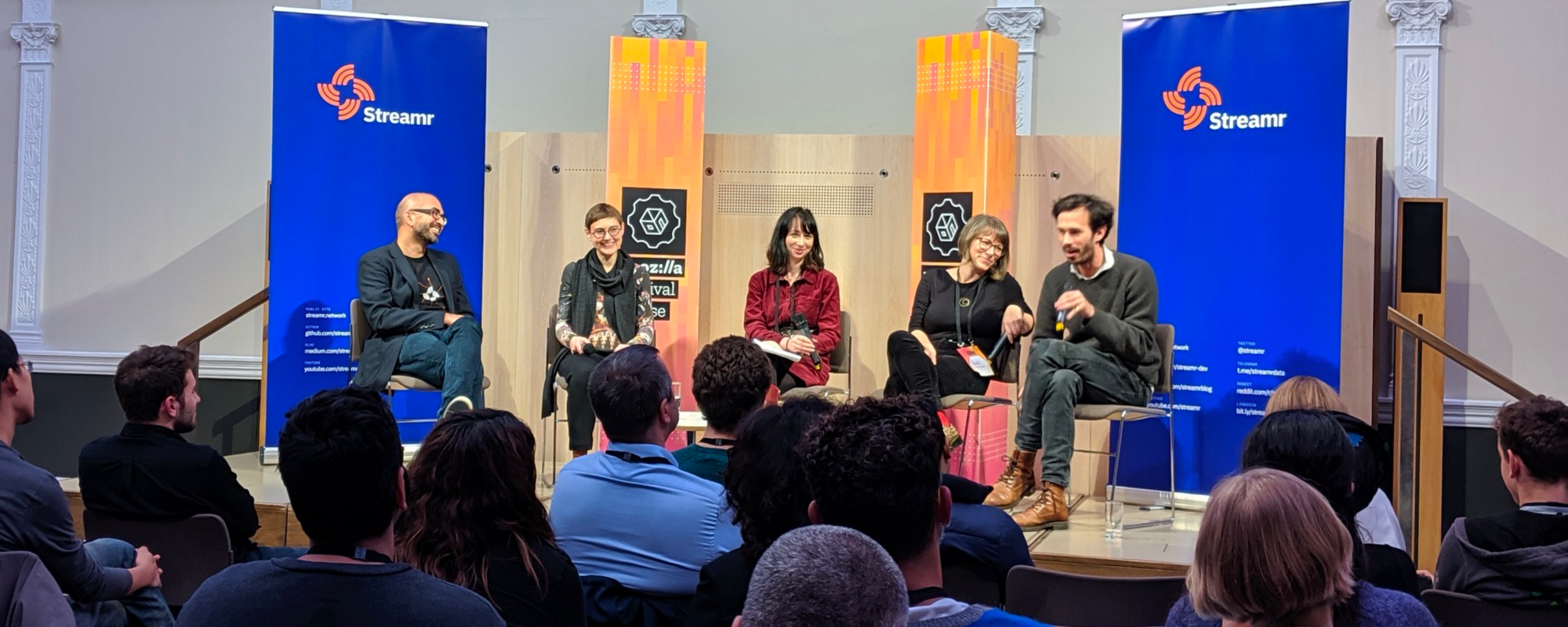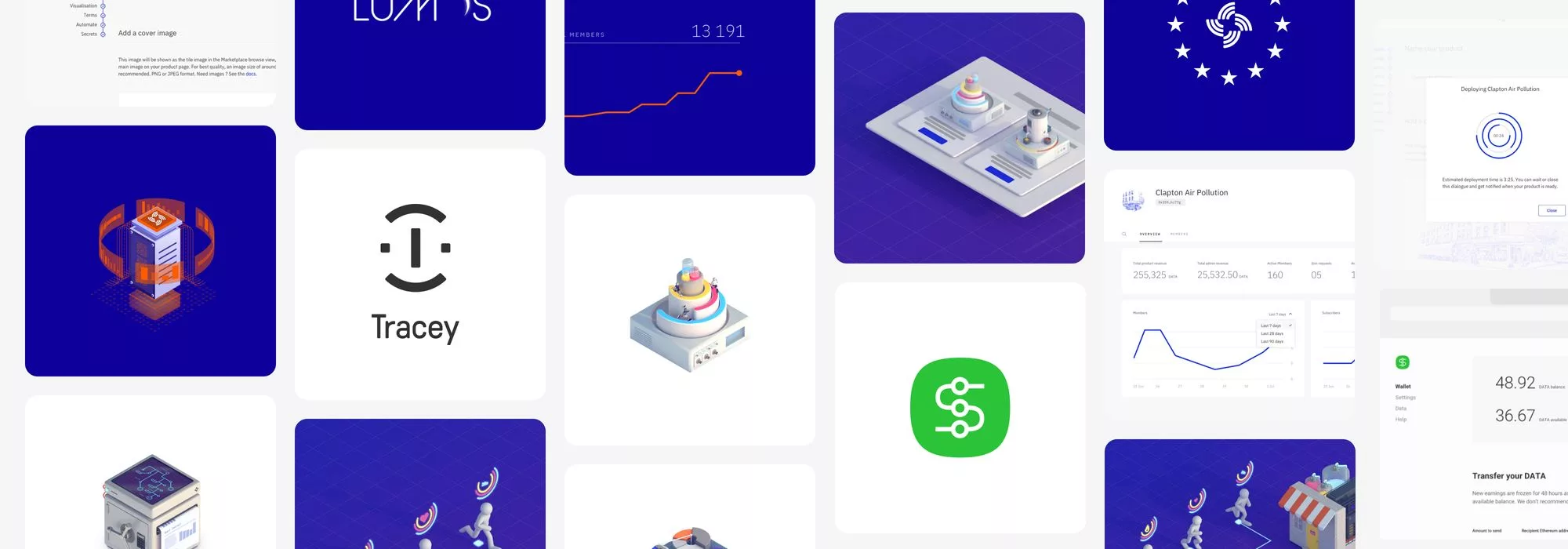Last year, Streamr’s CEO Henri Pihkala wrote about crowdselling data using Community Products — a new kind of data product made possible by Streamr technology and available via Streamr’s Marketplace.
As Henri explained, “What makes a Community Product different from other [data] products is… for the first time, end users can push the data they create to a larger saleable product and receive automatic payment every time that product sells.”
For anyone who shares Streamr’s belief that decentralized infrastructure will deliver a healthier distribution of money and power, this was a big moment. Flash forward to this year, Community Products are now known as Data Unions, and they have the potential to propel the work of the Streamr community into the consciousness of a much wider audience, bringing the goals of profoundly disrupting and transforming the current digital data paradigm closer.
The first Data Union is Swash, a browser extension developed by Streamr community members based in Turkey, that allows its users to capture, anonymise and sell their data. Launched late last year, it’s now attracted over 1000 users.
Given all this potential, Streamr were keen to increase their understanding of the users who are crucial to the success of Data Unions. Would people be interested in selling their data? What would make people tempted to join a Data Union? This is what we at Wilsome have been working on since October, and we’re excited to be able to share some of the insights now.
Table of Contents
What did we do?
In December 2019 we spoke to 21 men and women from around the world (UK, Spain, Malaysia, France, USA, Bangladesh, Sweden, Brazil, Italy, Germany, Czech Republic) aged between 18 and 55 years-old. 11 of them were more tech-confident Early Adopters, while 10 were in the Early Majority category — the crucial segment who are slightly further behind the curve in terms of adoption of technology and are essential to reach if mass adoption is to follow. We hosted three focus groups (all in the UK), then spoke to everyone individually in a follow-up interview.
We had some big questions to answer:
- Do people want to own and trade their personal data?
- Are they comfortable with using cryptocurrency to do this?
- Do people care about what’s happening with their data — and the way it’s being captured and exploited right now?
- Are they feeling any tension between the convenience and social fluidity that digital services give them vs what’s happening with their data behind the scenes?
- Do they actively want to change this ‘tyranny of T&Cs’ dynamic that exists at the moment? Are they even aware of it?
- What would motivate people to join a Data Union and crowdsell their data — and what would stop them?
We talked with people about these ideas and their own behaviour. We created concept boards for fictional crowdselling platforms to provoke a reaction. And we also invited them to try using the Swash browser extension — giving them the chance to decide what data they were willing to crowdsell, to earn some DATAcoin, and to see how they found the experience in practice.
While this qualitative research was with a limited sample of the large potential user base for Data Unions, the work produced some baseline attitudes around data and privacy to help steer future quantitative research, and clear insights that anyone developing Data Unions should consider as they design.
What did we learn?
1. People are not aware of a solution
Most people — even many Early Adopters — are not aware that data trading at an individual level is even possible. Although high profile scandals such as the Cambridge Analytica / Facebook data breach are on people’s minds, this isn’t yet translating into people actively thinking about personal data privacy or what’s happening to their data in their day-to-day lives.
The thing is that data I’ve already shared is out there now and I have no control over it. So it’s almost making me feel like I give up. What can I do?
– Leo (Early Adopter, 18, Brazil/Italy)
There was a passivity around the issue, underpinned by the sense of powerlessness many people expressed. Early Adopters tended to say they don’t know how to address the problem of personal data management, or that “it’s too late” — so aren’t worrying about it.
We have no choice — you just have to accept T&Cs and you miss out if you don’t use the apps.
– Nick (Early Majority, 18, UK)
Some Early Majority users explained their concern was mitigated because they saw a fair exchange happening between service providers and individuals.
We use the internet, they gather our data, that’s just the kind of give and take. Not hugely fussed about it.
– Ilse (Early Majority, 30, Germany)
A few people expressed trust in regulation such as GDPR fixing the issues, eventually. But for many people, there was a lack of trust in corporations’ capacity or interest in doing the right thing, and little faith in governments’ ability to do anything about it.
Corporations, because of law, they have things in place to protect your data but they often breach these. They often do because they know they can get away with it. What’s a fine of a few million to them? They’ll make a billion tomorrow.
– Nish (Early Adopter, 19, Bangladesh)
Based on what we heard in this research, before people can take advantage of the benefits of joining a Data Union, there’s a job for someone to do to help people grasp the idea that a different relationship and power balance with their data is possible.
2. Once they get the idea, people like it
Once we explained and demonstrated the concept of crowdselling and Data Unions, most people liked it, and some loved it.
It didn’t take long for Early Adopters to grasp the idea. A straightforward explanation of a tool like the Swash plugin was enough for them to get on board. And trying it for themselves was sufficient proof of concept.
One of those brilliant ideas where you think ‘why didn’t I think of this first?’.
– Nish (Early Adopter, 19, Bangladesh)
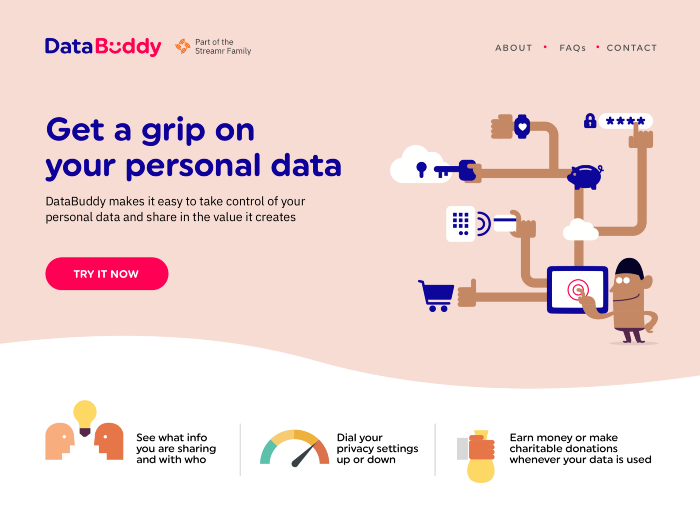
It was harder for the Early Majority to feel comfortable with it. They needed more information — everything from high-level explanations about the idea and potential benefits of a Data Union to the detail of how cryptocurrency works and the fine settings inside a Data Union tool. But once they got it, they tended to like it (and most of them liked it a lot).
I would need to know who is buying the data and I would need to feel I was getting enough money. If I felt comfortable about that then I would be 10/10 certain to use it.
– James (Early Majority, 23, UK)
3. ‘Money for nothing’ appeals
The clearest motivator for people was the prospect of ‘making money for something you’re doing already’, even if that meant small amounts.
As long as it’s data that is probably going to be shared anyway, I think it’s a great idea because I feel that you have more say over that data and you’re getting a financial reward for something that up until now… companies were just taking.
– Jerry (Early Adopter, 27, UK)
The amounts that people estimated they might earn for different types of personal data varied, especially around social media. Many expressed interest and curiosity about the value of their data in a marketplace — tempered with a sense of realism about what it might be possible to earn in practice. When asked to put a price on data streams such as music streaming, financial activity, online shopping and social media activity there was considerable variation — banking data valued highest, music the lowest. Overall there was a ‘wait and see’ approach to understanding what they would accumulate with the Swash plugin over time.
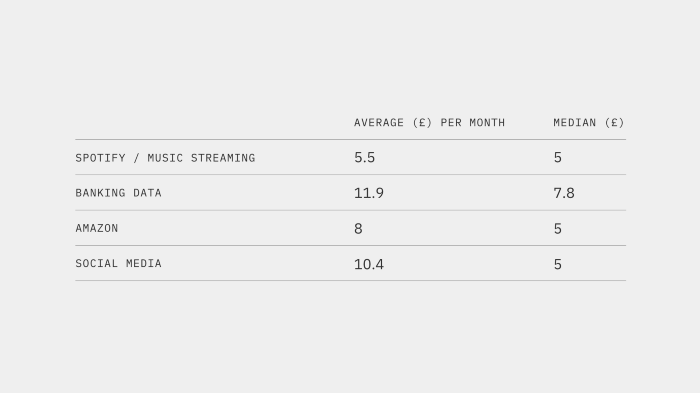
4. People want visibility and control
People appreciated the control and flexibility they experienced when trying the Swash plugin. Many felt that having that visibility was educating them about how much data they are sharing without thinking about it. They wondered if it might also help them learn the true value of their data over time.
I think I’ve just become a bit more aware of what’s going on. I didn’t really realise that there was any way for us to be able to get paid for this data that was kind of stolen. So it’s quite interesting.
– Tori (Early Majority, 20, UK)
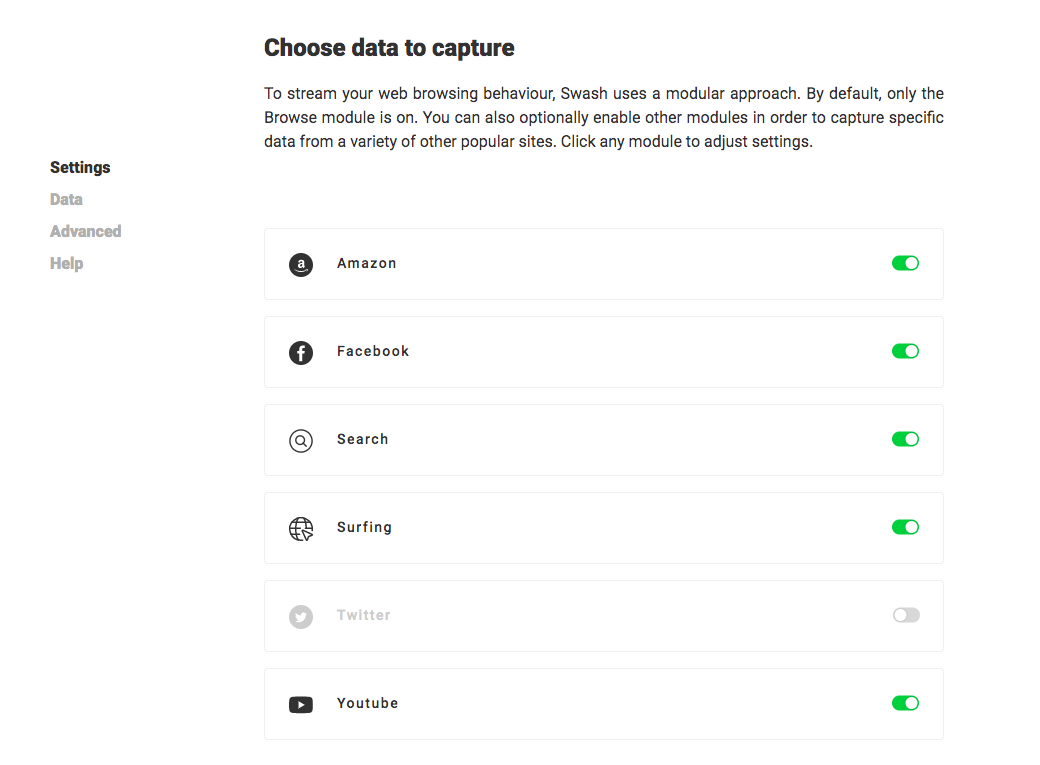
5. Crypto is not a barrier
Trading data using cryptocurrency wasn’t perceived as a problem by most people, even those who didn’t fully understand what it is or how it works. There was a basic level of trust that they could work it out with some research.
6. People want to know who’s buying
The greatest potential barrier for those considering using a Data Union was uncertainty over who would be buying the data. Most people wanted to be able to review and veto data buyers.
Perhaps I don’t want to sell this data to pharmaceutical company in US or some company from Russia…
– Makej (Early Majority, 39, Czech Republic)
So while the monetary reward was important, people were also interested in exerting control. This attitude was prevalent across all those we talked to, whether Early Majority or Early Adopter. It could be the biggest emotional lever to activate engagement with crowdselling and Data Unions for the long term.
In the future this will be standard — my grandkids will be shocked by the lack of control we have had.
– Leo (Early Adopter, 18, Brazil/Italy)
Conclusions
Overall, we found plenty of reasons for the Streamr community to feel confident that Data Unions are a concept that many more people could be ready for, given the right introduction and experience.
We hope our research helps to move understanding forward and to spark more analysis — in particular, there’s a need to test attitudes and behaviours at a greater scale through quantitative research.
At the moment, based on this research, we’d argue that the biggest barrier is a sense of ignorance about what’s possible, and passivity borne out of a sense of powerlessness or non-engagement with the issues around data and privacy. In a world where we all have a lot to worry about, this issue is lower down on our list. For now.
So first and foremost, while recognising the challenges around building trust and authority, we’d suggest that the immediate task is to start talking about the issues in a way that more people can understand, and demonstrating that at the very least we can all start to earn some basic income from trading our data without any real effort other than installing a simple plugin.
The gap between Early Adopters and Early Majority users is real. But it could be bridged by focusing on the tangible benefits to individuals, addressing the concerns around security and control and providing clear explanations of both the big picture and the finer details of the products themselves.
And the good news is that, based on what we observed in this research, there’s an appetite and enthusiasm for Data Unions across both groups once they get to try the technology for themselves.
Those who design with more cautious users in mind may be the ones to realise the scale and impact that Data Unions have the potential to achieve.
We’ll certainly be watching this space with close interest.
If you like to contact Streamr for more insight on this research, please email contact@streamr.network

